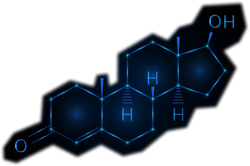Erectile problems are very common today and it is not difficult to boost testosterone production dramatically by eating testosterone boosting foods and avoiding foods that reduce testosterone. A healthy man has about 10-20 times more testosterone than a woman. Although it's thought of as "the male hormone", testosterone also plays an important role in women. Testosterone for women is produced in the ovaries and the adrenal glands. The ovaries function to help produce testosterone even after menopause. Therefore, women who have their ovaries removed are at significant risk for decreased testosterone levels and the subsequent symptoms associated with it. When testosterone production starts to fall, a man will start to become more feminine (way more irritable, frustrated, and suffering from a crashed libido). These effects are contrary to the myth that testosterone makes men aggressive and angry. Testosterone does not only affect libido but nearly everything in a man's life, affecting self-confidence, happiness, muscle size and potential diseases. Studies show that low levels of testosterone may increase the risk of developing depression, heart disease, diabetes and Alzheimer’s disease. Low testosterone can also cause irritability, fatigue, difficulty concentrating, memory problems and an enlarged prostate, as well as many other problems. Thinking about taking testosterone injections? Your natural system will shut down and you will need injections for the rest of your life. The best option is to fix your diet.

An easy way to know if you have low testosterone levels: the lack of morning erections. If you have regular morning erections, things should be fine. But if they are missing, then you you are either stressed or have the wrong diet. After thirty years of age, a man’s testosterone levels start to decrease which leads to many problems. Men who have low testosterone levels will experience weight gain, breast growth and problems with urination. We have investigated over 50 incredible foods (most of which you will love) that are scientifically proven to boost your testosterone production or have anti-estrogenic properties. Finding out your testosterone levels:
- Get a blood test that measures testosterone in 2 states. The total testosterone test measures testosterone that is bound to proteins in the blood (eg, albumin and sex-hormone binding globulin SHBG) as well as testosterone that is not bound (free testosterone).
- Repeat the test after 3 months (using the great foods). If you also start fasting, intermittent fasting and HIIT exercises, your testosterone levels will soar.
Low testosterone symptoms:
- Decreased sex drive.
- Erectile dysfunction.
- Lack of morning erections.
- Depression.
- Low self-esteem.
- Memory or concentration problems.
- Shrinkage of the testicles.
- Gynecomastia (manboobs).
- Inability to gain muscle mass.
- Gaining weight or becoming “skinny fat”
- Low testosterone leads to a "fatty liver".
- Fatigue and lack of motivation.
- Sleeping problems.

